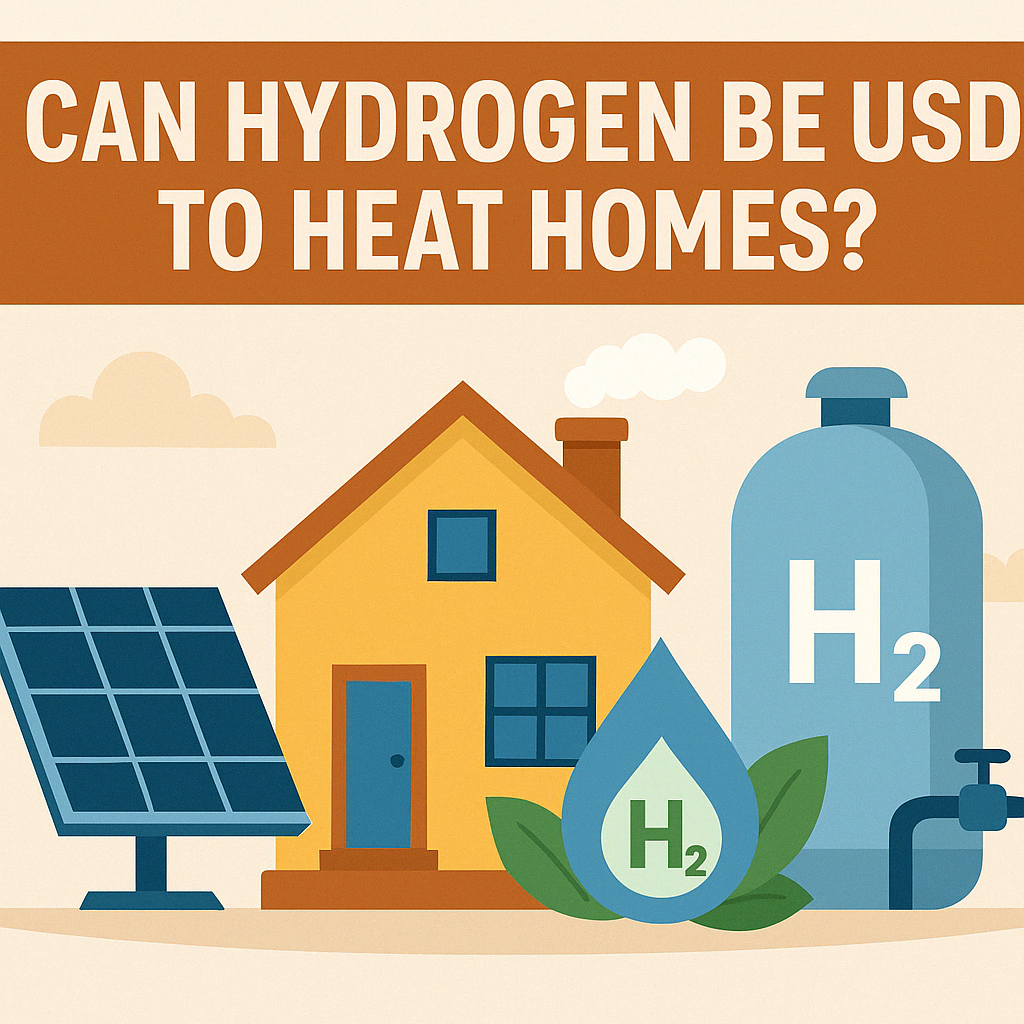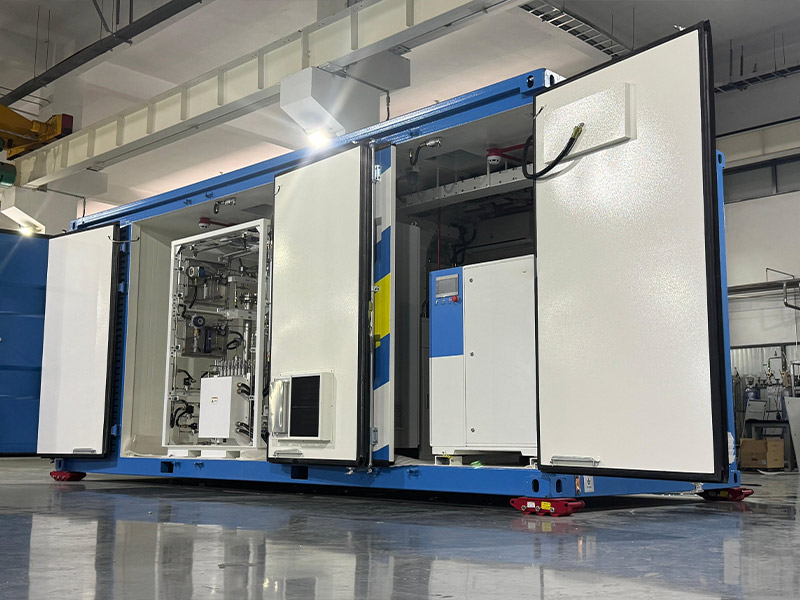As the world transitions to cleaner energy solutions, the question arises: Can hydrogen be used to heat homes? The short answer is yes — and the long-term potential becomes even more promising when hydrogen is produced using solar energy. This combination of renewable sources paves the way for a truly sustainable and low-emission future.

Keypoints
l Solar-powered hydrogen heating provides a zero-emission solution for homes by using renewable energy to produce clean-burning hydrogen fuel.
l This system works by using solar electricity to split water into hydrogen through electrolysis, then storing the hydrogen for later heating use.
l Homeowners can install hydrogen-ready boilers or fuel cells that convert the stored hydrogen into heat and electricity when needed.
l While initial costs for electrolyzers and hydrogen storage remain high, prices are dropping as the technology develops and scales up.
l Solar hydrogen heating offers particular advantages for off-grid homes and areas participating in hydrogen pilot programs seeking sustainable alternatives to fossil fuels.
Hydrogen is a clean fuel that, when burned or used in fuel cells, produces only water as a byproduct. It can replace traditional natural gas in home heating systems, reducing both carbon emissions and dependence on fossil fuels. But not all hydrogen is created equal — its environmental impact depends heavily on how it's made.
That’s where solar hydrogen, or hydrogen produced from solar-powered electrolysis, comes into play.
Hydrogen can be produced through a method called electrolysis, where electricity splits water (H₂O) into hydrogen (H₂) and oxygen (O₂). When solar panels provide the electricity for this process, the result is a zero-emission fuel made from two abundant resources: sunlight and water.
l Zero Emissions: No carbon dioxide, no pollutants — just clean energy.
l Renewable and Infinite: Solar energy is virtually limitless.
l Home Integration: Solar panels and electrolyzers can be installed onsite for local hydrogen production.
Energy Independence: Reduce reliance on grid-based electricity or fossil gas.
Using hydrogen to heat a home can be done in several ways. The most common methods include:
l Hydrogen Boilers: Similar to natural gas boilers but adapted to burn hydrogen.
l Hydrogen Fuel Cells: Convert hydrogen into electricity and heat simultaneously.
l Blending Hydrogen with Natural Gas: A transitional solution that mixes hydrogen into existing gas networks.
When combined with solar electrolysis, homes can produce and store their own hydrogen for heating, especially useful in off-grid or rural locations.
Pairing solar panels with a home hydrogen system creates a closed-loop, sustainable heating solution. During the day, excess solar energy is used to produce hydrogen through electrolysis. That hydrogen is stored in tanks and used later to power a boiler or fuel cell during the evening or winter.
1. Year-Round Comfort
Solar hydrogen allows you to store energy in the summer and use it in the winter. Even on cold, dark days when solar panels aren’t generating much electricity, your home can stay warm using clean, stored hydrogen.
2. Lower Energy Bills
By producing and storing your own energy, you reduce your dependence on gas or electricity from the grid. This can lead to big savings over time, especially as energy prices continue to rise.
3. Zero Emissions
When hydrogen is used in a boiler or fuel cell, the only byproduct is water vapor—no smoke, no harmful gases. It’s a safe, environmentally friendly way to heat your home without contributing to air pollution or climate change.
4. Energy Independence
With solar hydrogen, your home becomes more self-sufficient. You’re less affected by energy shortages, rising utility prices, or power outages, which is especially useful in remote or rural areas.
5. Quiet and Low Maintenance
Solar hydrogen systems run quietly and require little day-to-day maintenance. Once installed, they work automatically—generating, storing, and using energy without constant attention.
6. Future-Ready Technology
As more homes and communities shift to clean energy, solar hydrogen systems will be part of the long-term solution. Investing in this technology now puts you ahead of the curve and helps build a greener future.
While the potential is enormous, there are still a few barriers to widespread adoption:
Cost: Electrolyzers and hydrogen-ready boilers are still expensive, though prices are dropping
Storage: Safe storage of hydrogen requires proper infrastructure.
Efficiency Loss: Converting electricity to hydrogen and then back to heat involves some energy loss.
However, continuous innovation and government incentives are helping to overcome these challenges and make solar hydrogen heating more accessible.
For households looking to reduce their carbon footprint while maintaining energy security, solar hydrogen heating systems offer a promising solution. As solar panel costs decline and hydrogen infrastructure improves, the pathway to affordable, clean home heating becomes more realistic.
While it may not yet be mainstream, the combination of solar energy and hydrogen fuel is one of the most compelling innovations in the clean energy transition — offering warmth, sustainability, and independence in one package.
As the world shifts toward cleaner energy, many homeowners are exploring hydrogen as a potential solution for heating and power. But is it the right fit for your situation? Hydrogen offers unique advantages—especially for off-grid living or regions with pilot infrastructure—but it’s not ideal for everyone.
Before making the switch, it’s important to weigh the benefits against practical considerations like cost, availability, and existing alternatives. Here's a quick guide to help you decide if hydrogen is a smart choice for your home.
Consider Hydrogen Heating If:
l You live in an area with hydrogen pilot programs
l Your home is off-grid with renewable energy
l You want to future-proof your heating system
Stick With Alternatives If:
l You have access to affordable electricity for heat pumps
l Hydrogen infrastructure isn't available in your area
l Cost is your primary concern
So, can hydrogen be used to heat homes? Absolutely — and when that hydrogen is produced using solar energy, the result is a revolutionary leap toward green home heating. With growing interest in renewable energy, solar hydrogen is poised to play a central role in powering the homes of tomorrow.
Yes. Hydrogen can be used in boilers or fuel cells to provide heat for homes. It’s a clean-burning fuel that emits only water when used.
Through a process called electrolysis, solar electricity is used to split water into hydrogen and oxygen. This method creates green hydrogen with zero emissions.
Yes. Modern hydrogen systems are designed with strict safety standards and are comparable to existing natural gas infrastructure.
Yes, with a solar panel system and a home electrolyzer, you can produce hydrogen on-site, especially useful for off-grid or hybrid systems.
Hydrogen offers zero-emission heating, energy independence, and the ability to store renewable energy for later use.


